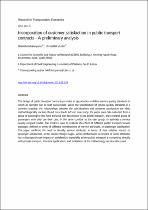 ResearchSpace
ResearchSpace
Incorporation of customer satisfaction in public transport contracts - A preliminary analysis
JavaScript is disabled for your browser. Some features of this site may not work without it.
- ResearchSpace
- →
- Research Publications/Outputs
- →
- Journal Articles
- →
- View Item
| dc.contributor.author |
Mokonyama, Mathetha T

|
|
| dc.contributor.author |
Venter, C

|
|
| dc.date.accessioned | 2012-11-20T07:52:28Z | |
| dc.date.available | 2012-11-20T07:52:28Z | |
| dc.date.issued | 2012-07 | |
| dc.identifier.citation | Mokonyama, M.T. and Venter, C. 2012. Incorporation of customer satisfaction in public transport contracts - A preliminary analysis. Research in Transportation Economics, http://dx.doi.org/10.1016/j.retrec.2012.05.024 | en_US |
| dc.identifier.issn | 0739-8859 | |
| dc.identifier.uri | http://www.sciencedirect.com/science/article/pii/S0739885912000698 | |
| dc.identifier.uri | http://hdl.handle.net/10204/6336 | |
| dc.description | Copyright: 2012 Elsevier. This is an ABSTRACT ONLY. The definitive version is published in Research in Transportation Economics, http://dx.doi.org/10.1016/j.retrec.2012.05.024 | en_US |
| dc.description.abstract | The design of public transport contracts provides an opportunity to define service quality standards to which an operator can be held accountable. While the specification of service quality standards is a common practice, the relationships between the specifications and customer satisfaction are often methodologically unclear. Based on a South African case study, the paper uses data collected from a group of passengers who have personal cars but choose to use public transport, and a control group of passengers who only use their cars, in the same corridor as the user group, to estimate a service quality conjoint model. The model is used to evaluate the effect of different public transport service packages, defined in terms of different combinations of service attributes, on passenger satisfaction. The paper confirms the need to classify service attributes in terms of their relative impact on passenger satisfaction, at the service design stages, where performance in respect of some attributes has a disproportionate impact on satisfaction, especially where public transport is competing directly with private transport. Practical applications and limitations of the methodology are also discussed. | en_US |
| dc.language.iso | en | en_US |
| dc.publisher | Elsevier | en_US |
| dc.relation.ispartofseries | Workflow;9601 | |
| dc.subject | Public transport | en_US |
| dc.subject | Conjoint analysis | en_US |
| dc.subject | Passenger satisfaction | en_US |
| dc.subject | Transportation | en_US |
| dc.title | Incorporation of customer satisfaction in public transport contracts - A preliminary analysis | en_US |
| dc.type | Article | en_US |
| dc.identifier.apacitation | Mokonyama, M. T., & Venter, C. (2012). Incorporation of customer satisfaction in public transport contracts - A preliminary analysis. http://hdl.handle.net/10204/6336 | en_ZA |
| dc.identifier.chicagocitation | Mokonyama, Mathetha T, and C Venter "Incorporation of customer satisfaction in public transport contracts - A preliminary analysis." (2012) http://hdl.handle.net/10204/6336 | en_ZA |
| dc.identifier.vancouvercitation | Mokonyama MT, Venter C. Incorporation of customer satisfaction in public transport contracts - A preliminary analysis. 2012; http://hdl.handle.net/10204/6336. | en_ZA |
| dc.identifier.ris | TY - Article AU - Mokonyama, Mathetha T AU - Venter, C AB - The design of public transport contracts provides an opportunity to define service quality standards to which an operator can be held accountable. While the specification of service quality standards is a common practice, the relationships between the specifications and customer satisfaction are often methodologically unclear. Based on a South African case study, the paper uses data collected from a group of passengers who have personal cars but choose to use public transport, and a control group of passengers who only use their cars, in the same corridor as the user group, to estimate a service quality conjoint model. The model is used to evaluate the effect of different public transport service packages, defined in terms of different combinations of service attributes, on passenger satisfaction. The paper confirms the need to classify service attributes in terms of their relative impact on passenger satisfaction, at the service design stages, where performance in respect of some attributes has a disproportionate impact on satisfaction, especially where public transport is competing directly with private transport. Practical applications and limitations of the methodology are also discussed. DA - 2012-07 DB - ResearchSpace DP - CSIR KW - Public transport KW - Conjoint analysis KW - Passenger satisfaction KW - Transportation LK - https://researchspace.csir.co.za PY - 2012 SM - 0739-8859 T1 - Incorporation of customer satisfaction in public transport contracts - A preliminary analysis TI - Incorporation of customer satisfaction in public transport contracts - A preliminary analysis UR - http://hdl.handle.net/10204/6336 ER - | en_ZA |





